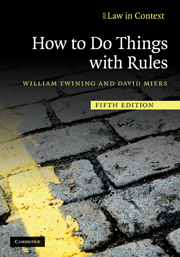Book contents
- Frontmatter
- Contents
- Preface
- Online appendices
- Acknowledgements
- Abbreviations
- Table of statutes and legislative instruments
- Table of cases
- Part I
- Part II Reading, using and interpreting rules in general
- Part III Reading law: reading, using and interpreting legislation and cases
- 6 Routine and problematic readings
- 7 Legislation
- 8 Interpreting legislation
- 9 Reading cases
- 10 The European dimension
- 11 Rules, reasoning and interpretation
- Part IV
- Index
- Resources on the web
- References
9 - Reading cases
Published online by Cambridge University Press: 05 June 2012
- Frontmatter
- Contents
- Preface
- Online appendices
- Acknowledgements
- Abbreviations
- Table of statutes and legislative instruments
- Table of cases
- Part I
- Part II Reading, using and interpreting rules in general
- Part III Reading law: reading, using and interpreting legislation and cases
- 6 Routine and problematic readings
- 7 Legislation
- 8 Interpreting legislation
- 9 Reading cases
- 10 The European dimension
- 11 Rules, reasoning and interpretation
- Part IV
- Index
- Resources on the web
- References
Summary
Reading cases: what? why? how?
In ordinary legal usage the word ‘case’ is ambiguous. We talk of ‘reading cases’, ‘citing cases’, ‘bringing cases’, ‘having a good case’, ‘winning cases’, ‘submitting no case to answer’ and so on. To bring a case against someone means to institute legal proceedings against him; to ask ‘have I a good case?’ probably means ‘have I a good chance of winning in legal proceedings?’. When we talk of looking up, citing or reading a case we are talking about a kind of document. Similarly in talking of interpreting cases it is helpful to think in terms of interpreting the rather specialised kind of document typically to be found in the law reports. For our purpose it is useful to adopt, with slight modification, the following definition:
A case is the written memorandum of a dispute or controversy between persons, telling with varying degrees of completeness and of accuracy, what happened, what each of the parties did about it, what some supposedly impartial judge or other tribunal did in the way of bringing the dispute or controversy to an end, and the avowed reasons of the judge or tribunal for doing what was done.
This definition identifies the principal ingredients with which we are concerned when interpreting cases, namely a written report, of a dispute between legal persons, which came before a court (or other tribunal).
Information
- Type
- Chapter
- Information
- How to Do Things with Rules , pp. 268 - 314Publisher: Cambridge University PressPrint publication year: 2010
